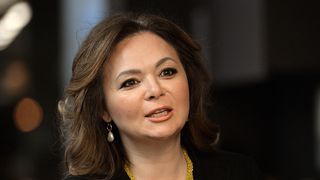The Russians have never left the stage in Washington DC, merely being off in the wings, but remaining ever present. Now they are back singing in the spotlight, courtesy of a former FSB lawyer named Natalya Veselnitskaya and a presidential son named Donald Trump Jr., brought together in a June 2016 meeting which was allegedly focused on the Russians furnishing the Trump campaign with dirt on Democratic nominee, Hillary Clinton. No dirt was produced. Supposedly.
The meeting went nowhere, according to the Trump camp. But the Russians at the meeting included a former GRU man, Rinat Akhmetshin, retired from Russian military intelligence – assuming a GRU operative ever leaves the building. The Americans present, on the other hand, included the presidential son-in-law, Jared Kushner and the then presidential campaign chief, Paul Manafort.
The Trump White House has now retreated from its earlier denials of no meetings at all with Russian officials or representatives; to a few meetings; to inconsequential meetings; to brief meetings. Whether or not this will hold in the theatre of congressional hearings or satisfy the forensic enquiries of Robert Mueller’s investigation remains to be seen. For there are three elements in the current Trump/Russia contacts in question that are very different from earlier controversies.
First, the Trump Jr./Veselnitskaya meeting involved the presidential family, which is difficult to dismiss under pressure, unlike the occasional attorney-general; certain Republican Party operatives; campaign officials or oddballs on the fringes of Trump for President. Second, and more significantly, there is Ms Veselnitskaya as a person of abiding interest. Reportedly she is close to the Russian Prosecutor – General, Yuri Chaika, who is himself part of President Vladimir Putin’s inner circle. Veselnitskaya, who was lobbying to have the Magnitsky Act amended or repealed by the US Congress, may actually have been in the Trump Tower on Chaika’s instructions. Chaika is the master of Kompromat, the system whereby a critic or opponent is seriously compromised by making public embarrassing or incriminating material. Sound familiar, perhaps? It was Chaika, with his then colleague and rising star, FSB Director, Vladimir Putin, who dealt with his predecessor, an inconvenient prosecutor-general, Yuri Skuratov, investigating then President Boris Yeltsin’s family and associates, over corruption allegations, by releasing vision of an illicit, steamy encounter in a Moscow hotel room.
There is now a tenuous link established between the Kremlin of Vladimir Putin and the Trump family in Washington DC.
Finally, there is President Trump’s dinner conversation with Putin in Hamburg, which was either brief or ran for an hour, depending upon who is telling the story. No US interpreter was present. There is no American note of the conversation. The Russians may claim whatever they like about the discussion. So the politics of DC have shifted again.
Expect more on the Magnitsky Act, which is named in honour of a brave individual, Sergei Magnitsky, a Russian lawyer and auditor, who blew the whistle on $US230million thefts of Russian State money. For his courage, Magnitsky was arrested and jailed in 2009; denied medical attention; tortured and eventually beaten to death in a Moscow prison. His employer, Bill Browder, a financial investor, ironically a grandson of one-time Communist Party USA general secretary, Earl Browder, has written the definitive account of Magnitsky’s murder in Red Notice. For a glimpse of the rancid nature of Putin’s Russia, Red Notice is illuminating and disturbing.
The Magnitsky Act held those Russian officials responsible for Magnitsky’s arrest, abuse and ultimate death to account, freezing their US assets and banning them from entering the US. Fortunately, the American criminal justice system works more openly and more fairly than its Russian counterpart, including protections for the liberties of the accused. The attendees at the June 2016 meeting in Trump Tower will be obliged to answer questions under oath. And that raises the most serious and sharpest legal threat to those involved: a potential charge of perjury, which prosecutors always hold in reserve. Absent the taking of the Fifth Amendment against self-incrimination, those answering Director Mueller’s questions will need clear memories and accurate responses. There is always a first time, of course. Or the potential for a pardon.
(To be continued....)






